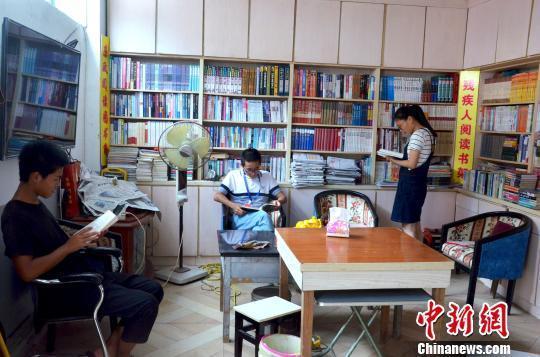
“It is the busiest time for the library when the children are on winter or summer vacations. They spend most of their time here,” said Liu Shijiang, the creator of the first library in Zhuguanlong village, Fujian province.
Back in 1974 when Liu graduated from high school, he came up with the idea of opening a library after he discovered his fellow villagers’ enthusiasm for novel things.
At that time, he found that villagers with itching ears would ask him to tell stories to while away the time in the evening. But it wasn’t long before Liu’s stock of stories ran out.
In addition to listening to stories, villagers mostly played mahjong and poker in the evening to kill time. “How can I give myself and the other villagers a healthier pastime?” Liu asked himself. That’s when he decided to buy some books.
The penniless man sold the only pig of his family for 200 yuan ($111 by the 1974 exchange rate) and borrowed another 400 yuan from the production team — a farm production unit in the people’s commune period — to buy more than 1,000 books as well as bookshelves and chairs, using one of his rooms as the library, which was open to the villagers free of charge.
Liu’s efforts came to pay off as more and more villagers gathered at his home to read books, such as picture-story books, novels or works about agricultural technologies. Among the most enthusiastic readers were the book-loving students and teachers in the village.
With the library increasingly popular among villagers, Liu, however, encountered a problem – his library was subsidized by the local government for 15 yuan a month, which was called off in September 1979.
To maintain the library, Liu taught himself woodworking and sold wooden benches and beds. In 1989, Liu used his savings earned from the sales of woodworks to build a two-story house made of brick and concrete, the first of its kind in the village, whose rooms facing the street were used as the library.
“I have seen many changes in my life. But despite the ups and downs, I have never given up on my library,” said Liu.
Over the years, Liu has met with various setbacks, but he managed to overcome them and kept his library in operation.
In 1989, Liu left the library in the charge of his wife to open a chicken farm in the county town of Shouning, a business that ended with failure. After going back home, Liu put all the money left from the business into the development of the library.
However, in the following years, Liu was forced to suspend the operation of the library after his youngest daughter was born and his wife fell ill.
To improve his family’s financial situation, Liu borrowed money to take the driving test and started driving for a living. In 1993, Liu returned home with the more than 10,000 yuan he earned, and decided to reopen his library.
Liu bought another 2,000 books to enrich the stacks and set up an exhibition room for the village’s history.
Now, his library houses more than 7,000 books and is equipped with facilities such as a computer, DVD recorder and Karaoke, offering more entertainment and learning options for the villagers.
“I have devoted my prime years to the library, and I will keep her company in my remaining years,” said the man, now in his sixties.



